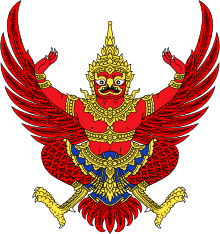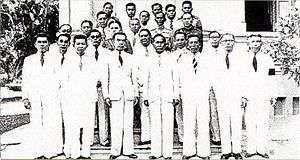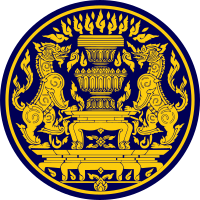Cabinet of Thailand
 |
|---|
| This article is part of a series on the politics and government of Thailand |
|
|
|
|
|
The cabinet of Thailand or, formally, the Council of Ministers of Thailand (Thai: คณะรัฐมนตรี; RTGS: Khana Ratthamontri) is a body composed of thirty-five of the most senior members of the government of the Kingdom of Thailand. The cabinet is the primary organ of the executive branch of the Thai government. Members of the cabinet are nominated by the prime minister and formally appointed by the King of Thailand. Most members are governmental department heads with the title of "minister of state" (Thai: รัฐมนตรี; RTGS: Ratthamontri). The cabinet is chaired by the Prime Minister of Thailand. The cabinet is often collectively called "the government" or "the Royal Thai Government".
History
Prior to the Revolution of 1932, the absolutist Chakri kings ruled Siam through a series of "krom" (Thai: กรม) and "senabodi" (Thai: เสนาบดี).[1] On 15 April 1874 King Chulalongkorn founded the King's Privy Council (Thai: สภาที่ปรึกษาในพระองค์) (which still exists today) made up of 49 senior princes and officials. For the first time the kings of Siam exercised his powers through a council.
On 14 July 1925 King Prajadhipok formed the Supreme Council of State of Siam (Thai: อภิรัฐมนตรีสภา; RTGS: Aphiratthamontrisapha) made up of 5 senior princes (all of them his brothers and all of them ministers of state) to help govern the country. However, after the revolution in 1932, the Khana Ratsadon decided to dissolve this council. Instead the new constitution created a direct precursor of the cabinet called: the People's Committee of Siam (Thai: คณะกรรมการราษฎร; RTGS: Khana Kammakan Ratsadon) led by a president. The privy council from then on became a royal advisory council.
With the promulgation of "permanent" constitution at the end of that year, the name of the committee was changed to the "council of ministers" and the name of the chair to prime minister, after King Prajadhipok deemed the old names too communistic. The first cabinet of Thailand was led by Phraya Manopakorn Nititada. All government departments and agencies were then immediately transferred to its control. To date there have been 58 cabinets of Thailand.
Ministers of State

Qualifications
According to the 2007 Constitution the cabinet is restricted to no more than 35 members. Members of the cabinet, unlike the prime minister, do not need to be a member of the House of Representatives, however most of them are. To be eligible to be a minister an individual must meet the following qualifications:
- Be a Thai national by birth.
- Be older than 35 years of age.
- Have graduated with no less than a bachelor's degree or its equivalent.
- Not be a member of the Senate (former senators must wait two years after their term of office to be eligible)
The individual must also: not be addicted to drugs, not have been bankrupt, not be a monk or a member of the clergy, not be disenfranchised, not be mentally infirm, not be under indictment or conviction, not have been expelled by a state agency for corruption or incompetence, not be a paid civil servant or member of the judiciary, and not ever been removed from any office by the Senate of Thailand.
Ministers of State are in theory appointed by the king, however in truth they are appointed at the advice of the prime minister to the king. Before taking office, a minister must make a solemn declaration before the king in the following words:
"I, (name of the declarer), do solemnly declare that I will be loyal to the King and will faithfully perform my duties in the interests of the country and of the people. I will also uphold and observe the Constitution of the Kingdom of Thailand in every respect."
Roles
The 2007 Constitution of Thailand calls the cabinet the "Council of Ministers". The entire IXth chapter is dedicated to it. There are only 20 cabinet ministries, which means that 15 ministers are without portfolio. They can, however, be appointed deputy prime ministers or deputy ministers. According to the constitution, the cabinet must, within fifteen days of being sworn in, state its policies to the National Assembly of Thailand. Ministers have the right to go in person to the national assembly to state and explain policies or opinions.
Each minister is responsible for his actions and the actions of his department and is therefore accountable to the national assembly. Therefore, the assembly can compel the minister to appear before it and explain his actions. The House of Representatives and the Senate can forcefully remove a sitting minister by a vote of no confidence. A one-sixth of the chamber vote is needed to call a debate and a simple majority is required for removal. A minister can also be removed by the king on the advice of the prime minister.
The Cabinet
Function
As the primary government institution in the executive branch, the cabinet is ultimately responsible for the administration and management of various government agencies and departments. It is also the primary institution for the formulation of policies with regards to all areas of politics and governing. Legislatively the cabinet is one of the institutions allowed to submit bills to the National Assembly for consideration. The cabinet is also allowed to call a joint sitting of the National Assembly to consider important bills or even join a joint sitting of the Assembly. The cabinet is also allowed to call a national referendum.
The cabinet is governed by the rule of collective responsibility, in which the members of the cabinet must support all policies despite personal or private disagreement. As a result, if the government fails or if the policies of the government fails then the entire cabinet must take responsibility; and resign in its entirety. The cabinet's term is wedded to that of the Prime Minister. The Leader of the Opposition is allowed to create his own cabinet or the Shadow Cabinet of Thailand.
Fourth Cabinet
This is the Prayut cabinet on 16 December 2016 updated.[2]
| Portfolio | Minister | Thai Name | Appointment Date |
|---|---|---|---|
| Prime Minister | Gen. Prayut Chan-o-cha | พลเอก ประยุทธ์ จันทร์โอชา | 24 August 2014 |
| Deputy Prime Minister | Gen. Prawit Wongsuwan | พลเอก ประวิตร วงษ์สุวรรณ | 30 August 2014 |
| Somkid Jatusripitak | สมคิด จาตุศรีพิทักษ์ | 19 August 2015 | |
| Air Chief Mar. Prachin Chantong | พลอากาศเอก ประจิน จั่นตอง | 19 August 2015 | |
| Adm. Narong Phiphatthanasai | พลเรือเอก ณรงค์ พิพัฒนาศัย | 19 August 2015 | |
| Gen. Tanasak Patimapragorn | พลเอก ธนะศักดิ์ ปฏิมาประกร | 30 August 2014 | |
| Wissanu Krea-ngam | วิษณุ เครืองาม | 31 August 2014 | |
| The Office of the Prime Minister | Ormsin Chivapruck | ออมสิน ชีวะพฤกษ์ | 15 December 2016 |
| Suvit Maesincee | สุวิทย์ เมษินทรีย์ | 15 December 2016 | |
| Ministry of Interior | Gen. Anupong Paochinda | พลเอก อนุพงษ์ เผ่าจินดา | 30 August 2014 |
| Deputy Ministry of Interior | Sutee Markboon | สุธี มากบุญ | 30 August 2014 |
| Ministry of Justice | Suwaphan Tanyuvardhana | สุวพันธุ์ ตันยุวรรธนะ | 15 December 2016 |
| Ministry of Defence | Gen. Prawit Wongsuwan | พลเอก ประวิตร วงษ์สุวรรณ | 30 August 2014 |
| Deputy Ministry of Defence | Gen. Udomdej Sitabutr | อุดมเดช สีตบุตร | 30 August 2014 |
| Ministry of Finance | Aphisak Tantiworawong | อภิศักดิ์ ตันติวรวงศ์ | 19 August 2015 |
| Ministry of Foreign Affairs | Don Pramudwinai | ดอน ปรมัตถ์วินัย | 19 August 2015 |
| Ministry of Social Development and Human Security | Gen. Adul Saengsingkaew | พลตำรวจเอก อดุลย์ แสงสิงแก้ว | 30 August 2014 |
| Ministry of Agriculture and Cooperatives | Gen. Chatchai Sarikan | พลเอก ฉัตรชัย สาริกัลยะ | 19 August 2015 |
| Deputy Ministry of Agriculture and Cooperatives | Gen. Chutima Boonyaprapas | ชุติมา บุณยประภัศร | 15 December 2016 |
| Ministry of Transport | Akhom Toemphitthayaphisit | อาคม เติมพิทยาไพสิฐ | 19 August 2015 |
| Deputy Ministry of Transport | Pichit Akarathit | พิชิต อัคราทิตย์ | 15 December 2016 |
| Ministry of Natural Resource and Environment | Gen. Surasak Kanchanarat | พลเอก สุรศักดิ์ กาญจนรัตน์ | 19 August 2015 |
| Ministry of Energy | Anantaphon Kanchanarat | พลเอก อนันตพร กาญจนรัตน์ | 19 August 2015 |
| Ministry of Commerce | Aphiradi Tantraphon | อภิรดี ตันตราภรณ์ | 19 August 2015 |
| Deputy Ministry of Commerce | Sonthirat Sonthijirawong | สนธิรัตน์ สนธิจิรวงศ์ | 15 December 2016 |
| Ministry of Labour | Gen. Sirichai Ditthakun | พลเอก ศิริชัย ดิษฐกุล | 19 August 2015 |
| Ministry of Culture | Veera Rojpojanarat | วีระ โรจน์พจนรัตน์ | 30 August 2014 |
| Ministry of Science and Technology | Achaka Sriboonreung | อรรชกา สีบุญเรือง | 15 December 2016 |
| Ministry of Education | Teerakiat Jareonsettasin | ธีระเกียรติ เจริญเศรษฐศิลป์ | 15 December 2016 |
| Deputy Ministry of Education | Lt. Gen. Surachet Chaiyawong | สุรเชษฐ์ ชัยวงศ์ | 30 August 2014 |
| ML. Panadda Diskul | หม่อมหลวงปนัดดา ดิศกุล | 15 December 2016 | |
| Ministry of Public Health | Dr. Piyasakon Sakonsatayathon | ปิยะสกล สกลสัตยาทร | 20 August 2015 |
| Ministry of Industry | Utama Savanayon | อุตตม สาวนายน | 15 December 2016 |
| Ministry of Tourism and Sports | Kobkarn Wattanavrangkul | กอบกาญจน์ วัฒนวรางกูร | 30 August 2014 |
| Ministry of Digital Economy and Society | Pichet Durongkaveroj | พิเชฐ ดุรงคเวโรจน์ | 15 December 2016 |
Fifth Cabinet
This is the Prayut cabinet as of 23 November 2017 updated.[4]
| Portfolio | Minister | Thai Name | Appointment Date |
|---|---|---|---|
| Prime Minister | Gen. Prayut Chan-o-cha | พลเอก ประยุทธ์ จันทร์โอชา | 24 August 2014 |
| Deputy Prime Minister | Gen. Prawit Wongsuwan | พลเอก ประวิตร วงษ์สุวรรณ | 30 August 2014 |
| Wissanu Krea-ngam | วิษณุ เครืองาม | 31 August 2014 | |
| Air Chief Mar. Prachin Chantong | พลอากาศเอก ประจิน จั่นตอง | 19 August 2015 | |
| Somkid Jatusripitak | สมคิด จาตุศรีพิทักษ์ | 19 August 2015 | |
| Gen. Chatchai Sarikan | พลเอก ฉัตรชัย สาริกัลยะ | 23 November 2017 | |
| The Office of the Prime Minister | Suwaphan Tanyuvardhana | สุวพันธุ์ ตันยุวรรธนะ | 23 November 2017 |
| Kobsak Pootrakool | กอบศักดิ์ ภูตระกูล | 23 November 2017 | |
| Ministry of Defence | Gen. Prawit Wongsuwan | พลเอก ประวิตร วงษ์สุวรรณ | 30 August 2014 |
| Deputy Ministry of Defence | Gen. Chaichan Changmongkol | พลเอกชัยชางมงคล | 23 November 2017 |
| Ministry of Finance | Aphisak Tantiworawong | อภิศักดิ์ ตันติวรวงศ์ | 19 August 2015 |
| Deputy Ministry of Finance | Wisudhi Srisuphan | วิสุทธิ์ ศรีสุพรรณ | 18 November 2014 |
| Ministry of Foreign Affairs | Don Pramudwinai | ดอน ปรมัตถ์วินัย | 19 August 2015 |
| Deputy Ministry of Foreign Affairs | Virasakdi Futrakul | วีระศักดิ์ ฟูตระกูล | 15 December 2016 |
| Ministry of Tourism and Sports | Weerasak Kowsurat | วีระศักดิ์ โควสุรัตน์ | 23 November 2017 |
| Ministry of Social Development and Human Security | Gen. Anantaphon Kanchanarat | พลเอก อนันตพร กาญจนรัตน์ | 23 November 2017 |
| Ministry of Agriculture and Cooperatives | Krissada Boonraj | กฤษฎา บุญราช | 23 November 2017 |
| Deputy Ministry of Agriculture and Cooperatives | Lak Wajananawatch | ลักษณ์ วจนานวัช | 23 November 2017 |
| Wiwat Salyakamthorn | วิวัฒน์ ศัลยกำธร | 23 November 2017 | |
| Ministry of Transport | Akhom Toemphitthayaphisit | อาคม เติมพิทยาไพสิฐ | 19 August 2015 |
| Deputy Ministry of Transport | Pairin Chuchot-taworn | ไพรินทร์ ชูโชติถาวร | 23 November 2017 |
| Ministry of Natural Resource and Environment | Gen. Surasak Kanchanarat | พลเอก สุรศักดิ์ กาญจนรัตน์ | 19 August 2015 |
| Ministry of Digital Economy and Society | Dr. Pichet Durongkaveroj | พิเชฐ ดุรงคเวโรจน์ | 23 November 2017 |
| Ministry of Energy | Siri Jirapongphan | ศิริ จิระพงษ์พันธ์ | 23 November 2017 |
| Ministry of Commerce | Sonthirat Sonthijirawong | สนธิรัตน์ สนธิจิรวงศ์ | 23 November 2017 |
| Deputy Ministry of Commerce | Gen. Chutima Boonyaprapas | ชุติมา บุณยประภัศร | 23 November 2017 |
| Ministry of Interior | Gen. Anupong Paochinda | อนุพงษ์ เผ่าจินดา | 30 August 2014 |
| Deputy Ministry of Interior | Sutee Markboon | สุธี มากบุญ | 30 August 2014 |
| Ministry of Justice | Air Chief Mar. Prachin Chantong | พลอากาศเอก ประจิน จั่นตอง | 23 November 2017 |
| Ministry of Labour | Police Chief Gen. Adul Saengsingkaew | อดุลย์ แสงสิงแก้ว | 23 November 2017 |
| Ministry of Culture | Veera Rojpojanarat | วีระ โรจน์พจนรัตน์ | 30 August 2014 |
| Ministry of Science and Technology | Suvit Maesincee | สุวิทย์ เมษินทรีย์ | 23 November 2017 |
| Ministry of Education | Teerakiat Jareonsettasin | ธีระเกียรติ เจริญเศรษฐศิลป์ | 15 December 2016 |
| Deputy Ministry of Education | Gen. Surachet Chaiwong | สุรเชษฐ์ ชัยวงศ์ | 30 August 2014 |
| Udom Kachintorn | อุดม คชินทร | 23 November 2017 | |
| Ministry of Public Health | Dr. Piyasakon Sakonsatayathon | ปิยะสกล สกลสัตยาทร | 20 August 2015 |
| Ministry of Industry | Utama Savanayon | อุตตม สาวนายน | 23 November 2017 |
| Deputy Ministry of Industry | Somchai Hanhiran | สมชาย หาญหิรัญ | 23 November 2017 |
2014 asset disclosures
In October 2014 Thailand's National Counter-Corruption Commission (NCCC) made public the assets of the prime minister and his cabinet. One-third of the ministers are worth more than 100 million baht.
The prime minister declared 128 million baht (US$4 million) in net assets and 645,754 baht (US$19,676) in debts. Deputy Prime Minister Pridiyathon Devakula, the wealthiest cabinet member, declared 1,378 million baht (US$42 million) in assets with no debt. Next is Panadda Diskul, who runs the Office of the Prime Minister, who declared 1,315 million baht (US$40 million) in assets and no debt. The least wealthy cabinet member is Education Minister Narong Pipatanasai with 6.95 million baht (US$211,696) in assets and 2.92 million baht (US$88,000) in debt.[6]
See also
References
- ↑ Glenn S., ed. (2013-08-17). "เสนาบดี" (Dictionary). Royal Institute Dictionary, 1982. Thai-language.com. Retrieved 2013-08-03.
เสนาบดี /เส-นา-บอ-ดี/ [นาม] (การใช้: โบราณ) แม่ทัพ. [นาม] (การใช้: โบราณ) ข้าราชการชั้นผู้ใหญ่. [นาม] (การใช้: โบราณ) เจ้ากระทรวง. definition: secretary of state; minister; commander in chief
- ↑ https://www.cia.gov/library/publications/world-leaders-1/TH.html
- ↑ http://www.bangkokpost.com/news/local/429745/prayuth-1-cabinet-endorsed
- ↑ "Ten new faces in reshuffled Cabinet, nine out". The Nation. 2017-11-24. Retrieved 1 February 2018.
- ↑ "New Cabinet line-up 'sent for royal endorsement'". The Nation. 2017-11-16. Retrieved 1 February 2018.
- ↑ "Assets of PM and Cabinet Revealed". Khaosod English. 2014-10-31. Archived from the original on 2014-11-29. Retrieved 2014-11-19.
External links
- 2007 Constitution of the Kingdom of Thailand s:2007 Constitution of Thailand
- Official Webpage
- Thai Government - Cabinet Announcement
- Additional Members of the Cabinet
- BBC - Thai post-coup cabinet sworn in (2006)
